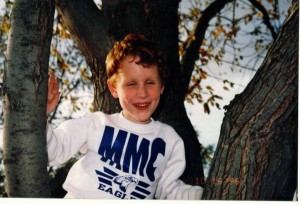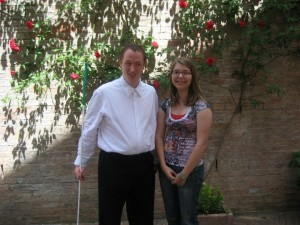Life through Justin’s eyes (Final)
11 12 2012A lot of college age guys spend their time in front of their televisions playing Xbox and sitting in their dorm rooms with their “bros,” just chilling. Other activities college guys enjoy involve eating, watching or playing sports, participating in outdoor activities, and flirting with pretty girls.
Justin Dixson, a super senior at Morningside College, who is a music major, has many of the qualities that describe college guys. Justin also enjoys singing old country songs and participating in his music fraternity Phi Mu Alpha Sinfonia. He is about 5’10” with brown curly hair, which is starting to grow thin in spots. When he walks he tends to drag his feet so you can here him coming before he even reaches you.
Even though Justin seems like any other guy on a college campus a few things set him apart from others, one being a green and white cane that helps guide him to his destination. Justin lost vision when he was just a baby.
Justin came to Morningside in 2008 to originally study computer science.
He said, “I didn’t do so hot my first semester, so I decided my second semester why not do something I love? Music! It’s awesome, it’s fun, and I enjoy it.”
After Justin graduates from Morningside, he plans to visit Washington with his aunt to visit a piano tuning school. One of Justin’s dream jobs is to tune pianos for a living. One of the items the school recommends to have for this job is perfect pitch. As uncommon as perfect pitch is, Justin has it. Only one in every 10,000 people have the capability to achieve perfect pitch. So when a human is missing one sense such as their sight, it only makes sense for something such as perfect pitch to replace it.
Justin has been in the Morningside College Choir since his second semester. What is it like to have someone in choir who has perfect pitch? Byron Brown, who has been in choir with Justin for two years said,
“It’s pretty much normal as any other choir except we don’t have to have a piano. If he gives us the right starting pitch we usually as a choir keep it afloat. It is cool sometimes to see the audiences’ reactions when they realize someone in the choir was the one to give the starting note and not piano.”
Although perfect pitch is uncommon, different people use their talent of it for different reasons. For Justin he uses his perfect pitch talent for music and it comes in handy for the choir. Brown admits, “It’s easier to sing next to Justin rather than others. He’s always on pitch.”
Brown also says their choir is lucky to have someone like Justin in their group. “In particular, it helps us when we travel. We don’t have to worry about a piano. Not many people have the ability to hum every note in tune so it’s cool to have someone in our choir like that.”
How did Justin exactly become visually impaired? He entered the world three and a half months early weighing only a pound a half. When he was born the doctors told his parents he only had a five percent survival chance. After he was born, he was moved to the NICU (Neonatal Intensive Care Unit), where each day he became a healthier, stronger baby. Through the next three months everything developed properly except his vision. His optic nerve was damaged in his eyes and both retinas were detached.
“I’m lucky being blind is the only thing wrong with me,” Justin says.
At the age of three, he had surgery to try and fix the optic nerve, but something went wrong in the surgery. No one is entirely sure what caused it; doctors have narrowed it down to two things. During the surgery, there was either too much oxygen to his eyes or his eyes were deprived of oxygen. That led him to become visually impaired. He is still able to see shadows such as people right in front of him, movement, or to tell if it’s sunny or cloudy out.
Dixson has overcome many obstacles so far in his 22 years of life. He has learned tasks such as teaching himself to eat, reading braille, walking around places independently, schoolwork, and other everyday activities.
Justin is usually seen traversing campus alone. He does many things by himself and he gives credit to the visually impaired schools he attended in the past. Although Justin does go places on his own he says it’s easier to go places with others.
One place he will not go by himself though is the cafeteria on campus. He says if he has no one to go with, he will stay in his room and eat the food he has there.
Someone who accompanies Justin a lot is a close friend of his at Morningside, Andrew Poeckes, or better known as just Poeckes to most. Many times at supper you will see Justin and Poeckes together because Poeckes serves as Justin’s eyes. He helps describe the food choices for the meal; gets Justin’s food, drink and silverware; and brings his food to him. After Justin is all settled Poeckes then gets his own food. If Justin wants a refill or more food Poeckes goes and gets it for him. People with their vision all too often take for granted little tasks such as getting their own food.
What does it feel like to be able to help someone who is visually impaired? Poeckes says, “I think it definitely has its advantages to learn to think about someone else next to you so you aren’t just off in your own little space. You are always with someone else and thinking about someone else.”
Poeckes has to pay special attention when he’s walking with Justin. He described how it feels to be someone else’s eyes. “Well first you have to get use to the fact there is another person right next to you. A particular event that this can relate to was when we were in Italy. I had to keep looking at the ground to make sure I wasn’t running him into things. It’s the thought of always having to pay attention to where you’re going.”
People with their vision often wonder how people who are visually impaired get around by themselves. For Justin it deals with memorization. For the first few trips to a new building he asked hall mates to accompany him to his classes. Once he had paths memorized it became easier. After he had all of his requirements other than his major out of the way it became even easier when he basically only had to make trips from Roadman, his dorm room, to Mac Collins, the music building.
The way Justin memorizes his way to classes is by doors. One of the nosiest doors on campus he explained is the first side door walking to the Mac Collins building.
He says, “That door is squeaky. When I leave my room, I go outside Roadman South’s door and if the wind is blowing the right way I can hear the door and say to myself, ‘Oh there’s Eppley.’”
Justin also uses the Science Center door to gauge where he is although he describes that door as fairly quiet. Justin says he has to start walking right towards the building before he can hear it opening and closing.
Since Dixson has been here five years now he’s pretty much got all the paths to different buildings memorized. Memorizing anything for someone with their vision and someone without is very different.
“I’ll have someone lead me there. I don’t count my steps. I just have someone point out which building is which for the first few times. Someone will say, ‘Okay, we’re going to the science center’ and I’ll hear a sound of the building and memorize that sound.”
Knowing where buildings are located for Justin has to do with just remembering. If he doesn’t remember he has learned to not be afraid to ask.
Once people first meet Justin they aren’t sure how to act because he can’t see them. After they have been around him awhile they realize Justin is a normal guy just without his vision. He’s got a one of a kind laugh, a voice of an angel when he sings and a very kind heart. Next time you see Justin out walking by himself ask him where he’s going and if you can help him. You just might learn what it is like to be another person’s eyes for a little bit.
Categories : 208 Stories




Recent Comments